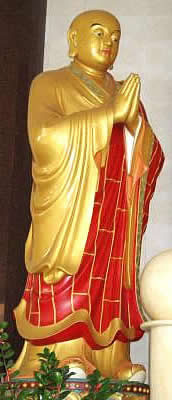Ananda, the Loyal Attendant
http://www.buddhanet.net/e-learning/bud ... 12lbud.htm" onclick="window.open(this.href);return false;
The Buddha had no regular attendant during the first twenty years of his ministry. Several monks used to attend to the Buddha, accompany him on alms rounds and carry his extra robes and bowl. The monks who served him were Nagasamala, Nagita, Upavana, Sunakhatta, Cunda, Sagata, Radha and Meghiya.
These monks did not always obey the Buddha's instructions. For example, one day when the Buddha and Venerable Nagasamala came up to a crossroads, the Venerable Nagasamala decided to go one way, although the Buddha suggested that they should go the other way. The monk went along the road of his choice and he was robbed and beaten by highway robbers. He came back to the Buddha to be reminded of his disobedience and consoled.
On another day, as the Buddha was on his way to the village of Jantu, Venerable Meghiya, who accompanied him, wanted to stop by a mango grove and practise asceticism. Three times the Buddha advised him against his idea, but Meghiva went his way. Eventually he returned to the Buddha and confessed that he had failed in his practice because almost all the time he was in the grove, three kinds of evil thoughts disturbed his mind: thoughts of sensual desires, ill-will and cruelty.
When the Buddha came to the Jetavana Monastery in Savatthi, he said, "Now I am old, Bhikkhus. When I say, 'Let us go this way,' some of you go the other way; some drop my bowl and robe on the ground. Choose one disciple to attend always on me." The Buddha was fifty-five years of age at that time.
The Venerable Sariputta and Moggallana both volunteered their services, but the Buddha didn't accept as they had other valuable services to perform for the world. The offers of other disciples were also turned down. As Venerable Ananda was silent, waiting to be nominated by the Buddha himself, other monks advised him to offer his services.
The Buddha said, "It is not necessary for Ananda to be induced by others. He will serve me of his own accord."
Venerable Ananda agreed to serve the Buddha regularly, subject to eight conditions:
1. He should not be given the robes received by the Buddha.
2. He should not be given the food received by the Buddha.
3. He should not sleep in the Fragrant Chamber of the Buddha.
4. He should not be asked to go with the Buddha to accept alms on invitation.
5. The Buddha should consent to invitations received by him.
6. The Buddha should give him permission to introduce visitors who came from afar to see the Buddha.
7. He should be allowed to consult the Buddha whenever he had any doubts to clarify.
8. The Buddha should repeat to him the discourses preached in his absence.
After the Buddha consented to these eight conditions, Venerable Ananda became the regular attendant of the Buddha and remained with him for twenty-five years.
Venerable Ananda was the son of King Suddhodana's younger brother, and therefore a cousin of the Buddha. He entered the order of monks during the second year of the Buddha's ministry and long after attained the first stage of sainthood (sotapanna) after hearing the sermon given by Venerable Punna Mantaniputta.
From the time he became the Buddha's personal attendant, Ananda served the Buddha with devotion and care, right up until his master's last moments. Day and night, he served the Master and he was faithful and dedicated. At night, for example, he would patrol the place where the Buddha was resting to prevent his sleep from being disturbed.
When acknowledging the qualities of his disciples, the Buddha said that Venerable Ananda was first among monks who are learned, mindful, well-behaved and determined. He was very much involved in the establishment of the order of nuns (bhikkhunis). And he is reputed to have had the Ananda bodhi tree, which survives today near the Jetavana Monastery, planted.
Although Venerable Ananda had the rare privilege to listen to every discourse of the Buddha, he did not attain arahantship until after the Buddha had passed away.
Venerable Ananda was said to have lived to one hundred and twenty years of age.
